Memories of Palestine (part 1)
In the spring of 2007 I spent a short seven weeks in the Palestinian West Bank, working as a volunteer with the human rights group ISM.
By now it has been 10 years already since I came home, but I can never forget what I have seen in Palestine.
Some memories are full of fear, others full of sadness, and sometimes anger engulfs me.
And then there are those other memories so hard to describe.
They show me that good does indeed prevail over evil. That goodness defeats hatred, violence and despair.
The memories I took with me from my weeks in Palestine and from the Palestinian people, a people who in spite of so much suffering have never lost their courageous spirit and their basic humanity, these memories will stay with me for as long as I live
- while I'm awake and in my dreams.
The following is a very personal account of why I went to Palestine, and about my experiences there.
(The videos are all from the internet, but some of the pictures on this page are mine, while others are not):
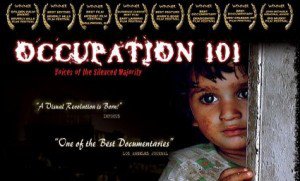 Occupation 101
Occupation 101
(watch here:
Although I hadn't yet seen this particular and very comprehensive documentary, in the years before I went to Palestine, I had read a lot about the situation there and the brutality of the occupation.
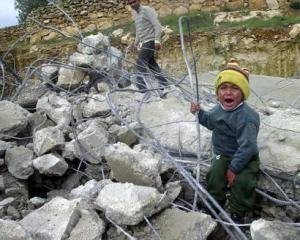 I had read about the oppression of the Palestinian people, the many crimes committed against them, like "targeted" assassinations with 1000 kg bombs dropped on residential neighborhoods or the house-demolitions which made so many Palestinian families homeless over and over again. But often, when I tried to talk about what I had discovered in the books and the articles I had read, I would be hushed down.
I had read about the oppression of the Palestinian people, the many crimes committed against them, like "targeted" assassinations with 1000 kg bombs dropped on residential neighborhoods or the house-demolitions which made so many Palestinian families homeless over and over again. But often, when I tried to talk about what I had discovered in the books and the articles I had read, I would be hushed down.
People kept telling me:
"You haven't been there, so you know nothing."
So then in spring of 2007, I went to see and look at the truth with my own eyes.
I took a long vacation from work and family, and I talked to a group here in Iceland which did solidarity work for Palestine. They gave me a list of what I needed to take with me, and they also told me that sometimes the Israeli immigration doesn't allow foreigners to enter the country even as tourists, if they are suspected of being pro-Palestinian.
But I was lucky, I didn't look political.
When I returned home, I took a few scars with me - some on my body, but most on my soul. Those scars have taken a while to heal, and sometimes they still hurt.
When I tried to get on with life at home, picking up from the same point I had left it, I couldn't.
I went back to work.
However, after a short time I had myself transferred to night-shift so I would meet fewer people. In this way I wouldn´t have to talk, because I really couldn't, not calmly at least. When I tried, my words started falling over themselves, rushing from my mouth, too fast, too loud - breathless. Nobody could understand me, since I couldn't explain.
I would not even go to the meetings of the solidarity group any more, I was afraid to break down completely. Besides I felt rather embarrassed, since I had written some rather frantic letters home to them.
.
What troubled my mind
To be honest, the occupation of Palestine wasn't the only thing that weighed on my mind at the time.
I have never been cool, detached or very stress-resistant; I've always been a bit emotional.
And even before I went to Palestine, my mind was troubled by a recent realization which had shaken my view of the world to the very core:
Finally I had had to accept that there was actual evil in this word.
No matter what had happened in the world before 2001, I had always trusted in our western system and way of life, flawed as it might be.
"Sure, our system might need a few improvements here and there. But nothing is perfect and nobody is, including me," I had thought.
And while I accepted the world‘s being imperfect, I didn't believe that in our part of the world and in our time, evil--real true evil--existed.
 This started to change about two years after the events of 9/11.
This started to change about two years after the events of 9/11.
That the so-called democratic government of our closest ally could be involved in the killing of its own people, its own loyal citizens, for the purpose of justifying an upcoming series of wars, which would be killing even more innocent people, seemed to me beyond the realm of simple imperfection. For me this indeed appeared to be a manifestation of true evil.
What convinced me in time of the veracity of the claims made by the truth movement wasn´t any conspiracy theory, but the physical evidence presented by scientific researchers, educated people with degrees in physics, chemistry, architecture and engineering.
In my mind the laws of physics are something to trust in and hold on to. They are immutable, real.
However, what had disturbed me even more than the acts of those American government insiders, those political instigators of 9/11, was the reaction of those other institutions, the ones I had previously always trusted unconditionally to tell me the truth about events happening both now and in the past. I had trusted them--the media and the academic experts quoted by the media--to explain the world to me as it supposedly is; in fact, I had trusted them far more than I had trusted most politicians.
It was the refusal of the mainline media, even here in Europe, to look at the plain and very visible evidence, and the so-called "experts" who were ready to lie about this evidence or omit the most relevant facts for political purposes, which destroyed my fundamental trust in the western system. This loss of trust turned my world upside-down and brought sad disappointment into the deepest recesses of my soul.
Soon after my 9/11 discoveries, I realized that those lies were far from being the only big ones we had been told over the decades, with the lies propagated about Israel and Palestine being among the worst examples.
Until then, with my own partly Jewish, partly German background, I had firmly believed the story I had heard countless times that the Zionist Jews, when they had come to Palestine in the first half of the 20th century, had found a desert and had made the desert bloom. I had believed the tale that before that time, the Palestinians had been just a few nomadic tribes living all over the Arabian deserts, in tents or something, and that they were just spiteful and jealous fanatics who couldn't be reasoned with.
Even when the TV news told us occasionally about Israeli settlements in areas claimed by Palestinians being an obstacle for peace, even then I had thought: "So what, it's desert anyway. The settlers will just make the desert bloom a little more."
.
The Truth about Palestine
The terrible truth I now discovered was that all those tales were untrue, and the reality was the exact opposite of my earlier beliefs:
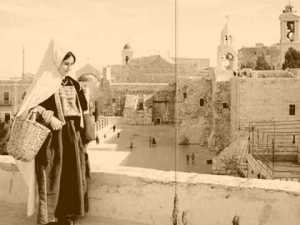 Palestine had continuously been settled in towns and villages for thousands of years by people with a rich culture. Crops had been planted and trees been cultivated for all these times.
Palestine had continuously been settled in towns and villages for thousands of years by people with a rich culture. Crops had been planted and trees been cultivated for all these times.For several hundred years before the arrival of the European Zionists, the Islamic, Christian and Jewish populations of Palestine had been living peacefully together side by side. It was the brutality and arrogance of these European immigrants which destroyed that peace. And it was these Zionist immigrants who were the unreasonable fanatics.
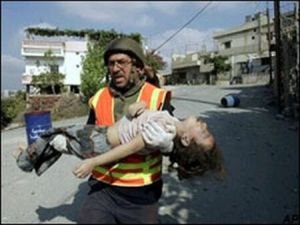 Having started to read seriously, I also found out that not only had Israel been involved in crimes against humanity among the Palestinian people, some of them unimaginably horrific, but Israel has also committed war-crimes in Lebanon, Syria and Egypt.
Having started to read seriously, I also found out that not only had Israel been involved in crimes against humanity among the Palestinian people, some of them unimaginably horrific, but Israel has also committed war-crimes in Lebanon, Syria and Egypt.
The picture to the left was taken after Israel had bombed a UN shelter full of civilians during Israel´s 2006 aggressive invasion of and air attacks on Lebanon.
And in the last few years, Israeli agents, like the leaders of AIPAC and the Neocons, pushed the US into the war in Iraq, which has cost over a million human lives. And still they aren’t satisfied, and they keep pushing for a war with Iran, which might be the beginning of WWIII.
And while Israel presents itself as an innocent victim of violence and racial hatred, in reality it is Israel who is victimizing others, both openly--with its military power used against the Palestinian people and neighboring countries--and covertly all over the world especially in Africa and South-America
Israeli special forces have been involved in the civil war in south-Sudan, as well as in other African countries. In the 1980‘s and 90‘s, they trained the right-wing death-squads in Colombia as well as in Guatemala and El Salvador, while the Americans trained the regular armies. Israel has been involved with and funneled weapons to the brutal contras in Nicaragua.
Israeli intelligence units tricked the American military via false information into bombing Libya, and they have trained and armed both sides in the Sri-Lankan civil war--the Tamil separatists, as well as the central government troops.
Israeli intelligence members or assets, often Jewish citizens of Arabic countries, have committed several proven false-flag operations in the Middle East against western targets, as well as several more suspected operations, all to make Arab people look bad.
One Israeli intelligence operation involving false flag bombings, was the so-called Lavon affair in the 1950s in Egypt.
In Iraq in the 1950s, the Mossad, using young manipulated Iraqi Jews like Naeim Giladi, even attacked Iraqi synagogues to scare Iraqi Jews into fleeing to Israel.
While Giladi, the whistle-blower who had been involved in this particular special operation, actually regretted his role, other special operatives have shown no remorse but actually bragged about their "successes" in destabilizing countries, starting off civil wars, and supporting right-wing coups.
An Israeli psychology professor and policy-critic writes about this Israeli involvement in backing and arming brutal regimes and rebel groups throughout the world in his book:
"The Israeli connection - Who Israel arms and why"
What I then read from published documents and even diaries from earlier Israeli politicians is a callousness and bloody-mindedness beyond anything I could ever imagine, a total disregard for human life.
See: "Israel´s Sacred Terrorism by Livia Rokach"
Even now it is hard for me to talk about either my experiences, or the propaganda and lies which so many people still accept as truth, without getting emotional. And once again, it is the lies which hurt the most.
Yes, there are other places in the world where even worse human rights violations are committed by other armies, governments, or militias, but Israel is the only country that commits Nazi-like war-crimes and crimes against humanity yet still presents itself as a democratic nation, justified in all its deeds, a small and powerless victim--not a powerful aggressor.
The whole country is based on a racist ideology, Zionism. And still Israel's apologists get away with calling all critics of Israel's brutal policies racists or anti-Semites.
But reading about all this was in many ways different from experiencing it with my own senses, my own eyes, ears and occasionally my own skin.
And still, what I experienced and what shook me up so much, even after I had come home, was that for Palestinians, this is their everyday life. They have to live with these kinds of physical attacks and acts of humiliation and psychological warfare all the time, while I could go home and feel safe again.
And I often marvel at how the Palestinians can stay so strong in all this. Maybe it is the knowledge of every man, woman and child that they are on the moral high-ground.
Yes, even a Palestinian child knows that truth and universal ethics is on his side, and this knowledge makes many Palestinians wise beyond their years while retaining a touching innocence of spirit.
(Read the last paragraph about "The Child and the Bullet" for a good example of this.)
As for the Israelis, I've somehow got the feeling that for all their self-righteous posturing, they indeed know deep down in their hearts that they are on the moral low ground, the very low ground. And most Israelis and supporters of Zionism cannot yet face this knowledge consciously and live with themselves.
Somehow the strength of the Palestinians I observed gave me strength while I was there in Palestine, and now those memories give me hope.
.
Jerusalem
While I worked with ISM, an international human rights group under Palestinian leadership, I was stationed in Hebron and spent most of my seven weeks there. But I also went to other places in the West Bank in between.
When I went to Jerusalem, I met a family whose members had almost all been arrested at some point and jailed for years. But don't think that my friends are in any way unique in their experiences.
The fact is, at least one third of Palestinian men have been in Israeli jail at one time or another; for women, the percentage isn't quite as high, but many are still arrested for political reasons.
My friends had been members of a left-wing party. The party had been legal once, and then it was banned by Israel. One son of the family had been arrested at age 17 and jailed for nothing more than having been a member of the party.
His mother had organized a dinner-party for her friends, all of them political women. And when she was serving the food, Israeli soldiers burst into the house. She tried to run away and was caught. Running away was the offense that cost her four years of her life.
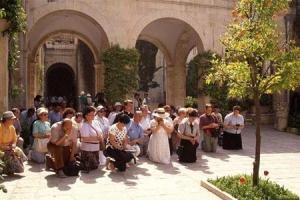
In Jerusalem I of course went on the traditional pilgrims’ way, the Via Dolorosa, praying the "Stations of the Cross".
These prayers, a remembrance of Christ's suffering, which are normally done during the season of Lent in churches all over the world, are prayed here in Jerusalem every week in a procession along the "Via Dolorosa", "the street of pain". According to Christian tradition, this is the way Jesus took to his crucifixion, out from the ancient city of Jerusalem and up to the hill of Calvary. Today this hill is also part of Old Jerusalem and the site of the Crucifixion Church.
Incidentally, this church, built on one of the holiest places in Christian tradition, is practically next door to the Al Aqsa mosque, the third holiest site in Islam.
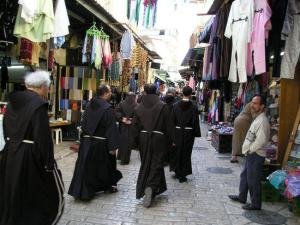
Every Friday afternoon, a group of Franciscan monks leads worshipers on this way. The day I followed the procession, we were quite a large group.
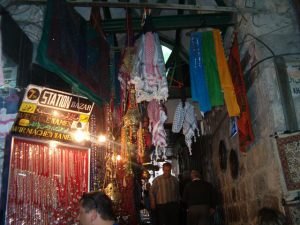
I was bit surprised that the Via Dolorosa is in large parts a shopping street, something like a little bazaar where all kinds of goods are being sold.
But then this would not be so very different from the times of Jesus.
The way Jesus and other condemned prisoners were led to the hill of Calvary would also have been a very ordinary way, where people conducted their ordinary everyday businesses.
And at every "Station" where we stopped and prayed, the mostly Muslim passers-by and shoppers waited for us patiently while we positioned ourselves along the walls in the narrow street, and most often, they smiled at us.
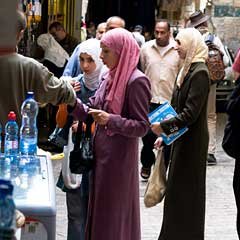
In the same way, earlier in the day on Friday at noon-time, we Christians had had to wait for Islamic worshipers coming out from Al Aqsa mosque in great numbers, blocking the narrow streets.
At every Station, the Franciscan monks who led our prayerful procession gestured to us to make room for the passers-by and so we did.
But then, all of a sudden, the normality broke down.
We had stopped at the 8th Station. A group of people came from the opposite direction, the first one being a woman in western clothes who wanted to pass. But instead of waiting for just a few moments, she attacked the monk who gestured for her to wait. She hit him with her fists, hit him several times, just because he was not getting out of her way quickly enough. Seeing this was a shock for me. The woman was surely no Christian; certainly from the way she was dressed, she was no Muslim. There could be only one guess as to who she was, but still, why would she do this?
Who would hit a monk?
.
Bethlehem
When I went to Bethlehem, I learned that Muslims and Christians in Palestine are friends. There is no difference in their sufferings or in their being oppressed.
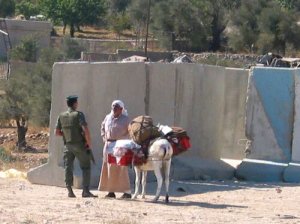
I learned that the birth-town of Jesus is surrounded by walls and check-points, and that if Mary and Joseph had lived today, they couldn't have brought Jesus to Jerusalem nor back to Nazareth, and even getting to Egypt for safety would have been next to impossible.
And when I think of the child-murders committed at the time of Jesus’ birth, which the Bible tells us were at the order of King Herod, then I also think about today´s children of Palestine and their danger of being murdered every day.
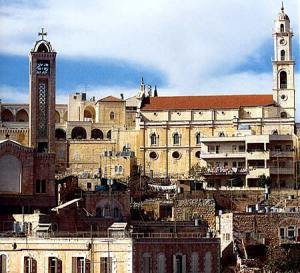
But I also learned that in the Holy Mass when the priest comes to the passage where he says "Almighty, eternal God", then in Arabic he says "Allah".
It reminds me, that we, Christians and Muslims, indeed pray to the same God.
Bethlehem, the cradle of Christianity, where the Prince of Peace was born, will see peace one day, true peace that comes from truth and justice, of that I'm sure.
.
Bi'lin, tear-gas, bullets and a Palestinian David
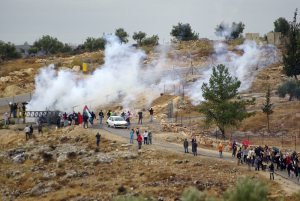
A couple of weeks after my arrival, I went to the demonstration of Bi'lin. Most Internationals go to the Bi'lin demonstration at least once.
It's a good thing to do that, for if no internationals or Israeli peace activists are at a demonstration, the rubber-coated bullets the soldiers shoot at the protesters will then become live ammunition, and Palestinians will die. It has happened many times before. The Israelis used to believe that nobody cared if Palestinians were killed, but if internationals or Israeli Jews are there, they would have to be more careful.
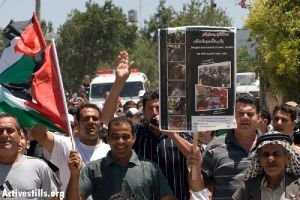 But even the presence of internationals does not hinder the Israeli soldiers who sometimes shoot to kill. The man second from the left in this picture of a Bi'lin demonstration in 2008,which looked pretty much like the one in which I participated in 2007, was killed by soldiers in another Bi'lin demonstration in 2009. He was killed by a tear-gas canister shot from a short distance directly at his chest. His name was Basem Ibrahim Abu Rahmeh. He was 30 years old and the sixteenth Palestinian to have been killed in those demonstrations in Bi'lin.
But even the presence of internationals does not hinder the Israeli soldiers who sometimes shoot to kill. The man second from the left in this picture of a Bi'lin demonstration in 2008,which looked pretty much like the one in which I participated in 2007, was killed by soldiers in another Bi'lin demonstration in 2009. He was killed by a tear-gas canister shot from a short distance directly at his chest. His name was Basem Ibrahim Abu Rahmeh. He was 30 years old and the sixteenth Palestinian to have been killed in those demonstrations in Bi'lin.
Rahmeh's death came a month after American human rights activist Tristan Anderson was shot in the head and put in a coma by the same weapon.
Two months earlier, two Palestinian teenagers were killed, Mohammed Khawajeh and Araft Khawajeh, in a similar anti-wall-demonstration in the village of Ni'lin .
In Bi'lin Israel thought it had created "facts on the ground". But even after the wall had been finished, which had taken 60 % of their land, the villagers did not give up.
When I came to Bi'lin, these villagers had already been protesting against this wall every single Friday for more than two years. They protested when the wall was started, and when it was under construction, and they are still protesting now that it has been finished (at least in Bil´in the wall is finished; it's still under construction in many other places.)
Walls don't have to stand forever, they can be broken down.
On the day I was there, the protest started with about a hundred people, most of them Palestinians, singing and chanting, holding hand-written signs. They were going from the village in the direction of the wall.
In the very front was a man in an electric wheel-chair. He and a small group of Palestinians reached the line of soldiers first, and right away the soldiers surrounded and arrested them.
I was in the second group, standing opposite the soldiers. The people around me tried to talk to the soldiers.
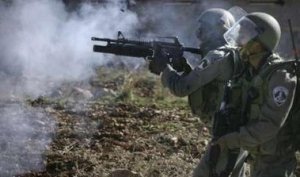 But the soldiers didn't want to talk. They pulled out those orange tear-gas cans and pointed their guns at us.
But the soldiers didn't want to talk. They pulled out those orange tear-gas cans and pointed their guns at us.
I had the urge to run, but I knew I couldn't run fast in this uneven terrain, and after a couple of steps, I just turned my back to the soldiers, pulled in my head and waited, hoping that my backpack would protect me from whatever they were shooting. I had been told before the demonstration had started that sometimes the soldiers shoot the cans with their cannons at close range directly into the crowd.
The soldiers had retreated a few steps, and the first tear-gas can landed right next to where I was standing. It was like the thickest fog on earth; it made me totally blind and I couldn't breathe. I had been told that this was the effect of the chemical, which tells your brain for a while that you can´t breathe and that you are suffocating. It also burned in my eyes, my nose and my throat. I tried to get away from the cloud.
But even if I'd known in what direction the wind was blowing, I had no sense of direction any more. Instead, I stumbled blindly around, and then I fell.
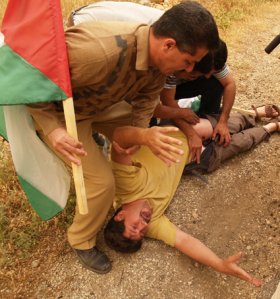 Somebody else fell down right behind me. He was screaming.
Somebody else fell down right behind me. He was screaming.
When I could see again, I turned around and saw a Palestinian man lying directly behind me, withering in pain.
I got up on my feet still disoriented, stumbling around.
Within a few seconds, a group of Palestinians came running past me and ministered to the injured man. They pulled down his trousers. And I saw he had been shot and was bleeding from his thighs.
I later learned that he had been hit by 2 rubber-coated bullets at the same time, shot at very close range, and both bullets had penetrated his legs, close to the abdomen. He needed an operation, and for several days he was in the hospital in bad condition.
I walked away following a group of internationals. When a group of soldiers pressed by us in the direction of the village, a couple of my friends decided to follow the soldiers to see if the soldiers were going to attack the village directly.
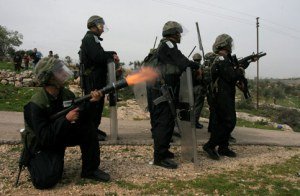 The soldiers, however, after shooting more and more tear gas grenades all over the place, turned around.
The soldiers, however, after shooting more and more tear gas grenades all over the place, turned around.
Panic-stricken I asked my friends if the soldiers would now shoot us from both sides. A short time later we were hit by a second cloud of gas.
My friends followed the soldiers to see what they were up to next. I stayed behind for I could no longer keep up. For a while I stood alone, and then another group of soldiers came running in my direction. By then I had become so scared of them, I only wanted to hide behind a tree or a rock.
But I had been told: "Do not hide, for if they see you hiding, they believe you're planning an ambush and they will shoot you." I had already seen one soldier aiming a gun that seemed to have no rubber bullet attachment, as if he was shooting with live ammunition. So I stood there with raised hands, scared to death, as they passed by.
When I eventually reached my friends again, a group of soldiers, followed by armored vehicles, came from behind. They pushed us aside. One of them, when he saw me trembling, said: "Don't be afraid, we're not going to hurt you."
But I'm not used to being shot at and pushed around with clubs and guns; I kept on trembling, I couldn't help myself.
Does anybody ever get used to this? I don't know….
And shortly thereafter, my friends and I were hit with tear-gas for the third time.
When we finally could leave the scene, over the fields, I had had far more than enough.
One of the images of Bi'lin that will probably stay in my mind as long as I live is the one of the boy on the hill with the slingshot.
The demonstration had been non-violent from our side the whole time, until shortly before it was over--that is, when this boy with the sling-shot appeared.
Yes, I know a sling-shot is a weapon too.
But the soldiers had helmets and shields, they were in no danger. They were aiming at the teenage boy, who stood there all alone on a hill with the ancient weapon of David, the teenager who fought the giant.
Was it five little stones, like in the song you learned in Sunday school?
I don't know.
But I could see him clearly, the boy with the one stone. And I could see the soldiers far below. The boy was standing not so far away from me. I could see the soldiers aiming at him. But at that very moment I wasn't scared at all.
Like David of old, the boy had put a stone in his sling, and round and round he swung it over his head until he released it. I don't think he hit anyone, and the soldiers didn't hit him either. Goliath never wins, not against David.
Ten people were arrested that day, 4 had been severely injured, and nobody had been killed...this time.
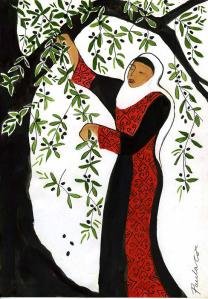
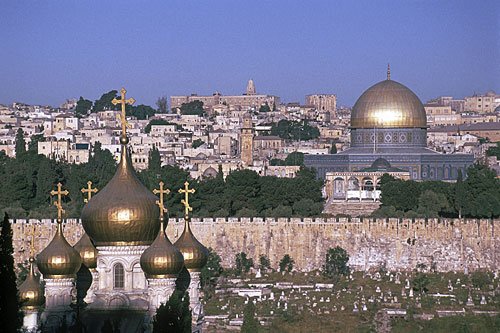
Excellent writing Eve. The story of your time in Bi'lin was gripping to read. I remember watching "Five Broken Cameras" for the first time and screaming at the screen at the cowards in the IDF.
I look forward to part II. I mentioned and linked to this in today's podcast post.
Thank you so much
Ooh my Eve, I have tears falling down my face reading this incredible article you have written. Thank YOU for all you have done. For a person to realize the truth, after believing lies, and then fight as you do for the Palestinians is such a rare quality. You are a Super Woman.
Goliath will NEVER win.
Thank you for the honesty, information, and the hope that you've brought me.
No, no absolutely no super woman, but thank you for reading . The second part of the report, about Hebron, follows tomorrow.
Great to hear, I'll be reading it for sure.
Wow. What an incredible story. Thank you for sharing it with us. It was a pleasure to read. Upvoted and Resteemed.
Much love and respect to you.
@fortified
Thank you for reading it.
:(
Thank you for you powerful post - my father was Algerian and taught me much about the history and beauty of this people. So as I grew up I always followed the plight of the Palestinians ... to this day. I don't think this injustice can continue with the power of the internet and free speech I think a change is coming - for the better. You may enjoy a post i made about the Wall runners of Gaza - keep well! https://steemit.com/people/@icedrum/meet-the-wall-runners-of-gaza